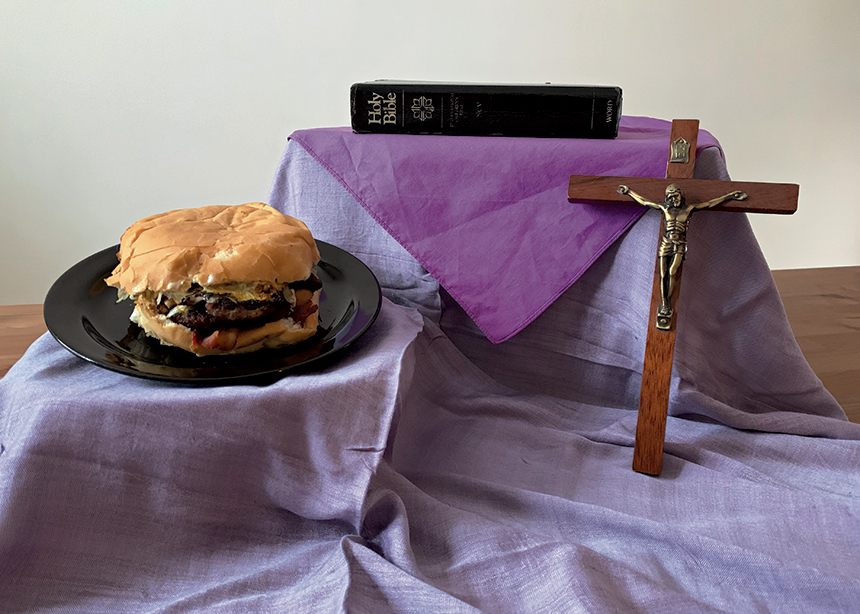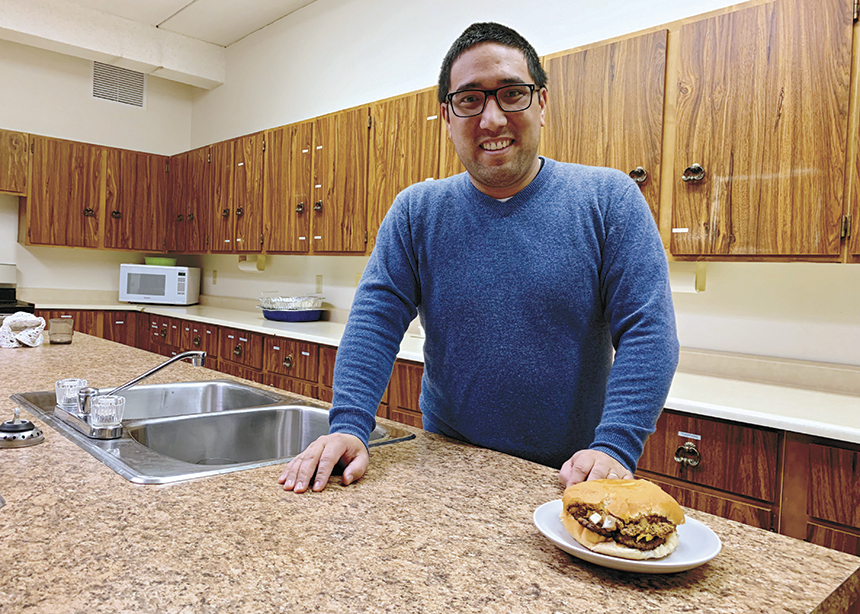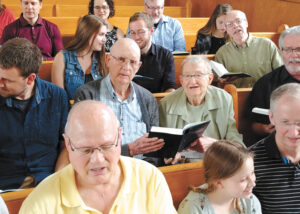Moses Falco is a Mennonite pastor who grew up Baptist, but for six weeks each year, he takes his cue from the Catholics.
At Lent, Falco gives up eating meat—the food that Catholics traditionally abstain from on Ash Wednesday and each Friday in Lent, including Good Friday. Rather than giving meat up on certain days, though, Falco refrains from eating it at all from Ash Wednesday until Easter.
It’s something the Winnipegger has done each year since at least 2018. The experience reminds him that although he loves meat, it’s something he can do without—unlike his relationship with Jesus Christ.
“Giving up meat for me is a difficult choice, and it’s also a very intentional and conscious choice I have to make every day of Lent,” says Falco, the pastor at Sterling Mennonite Fellowship. “Every time I do, I’m reminded of why I’m doing it.”
Lent—that period in the church calendar leading up to Easter that commemorates the 40 days Jesus spent fasting in the desert—begins on Feb. 22 this year. For many Christians, including some Mennonites, it’s a time of fasting and prayer.
The first few years Angelika Dawson observed Lent, she gave up things like coffee or sugar. While that felt like a discipline to the Abbotsford, B.C. resident, who attends Emmanuel Mennonite Church, it didn’t feel particularly spiritual. So, in 2003, Dawson gave up criticism for Lent.
Whenever she caught herself being critical of someone else, she would stop herself and imagine things from the perspective of the person she was criticizing.
“If someone cut me off while I was driving, instead of swearing at that beloved child of God . . . I allowed myself to wonder about how that person’s day might be doing and [I] offered up a prayer for them,” Dawson says.
This Lenten practice increased Dawson’s awareness of her behaviour and intentions, she adds. It made her more aware of God’s work in her life and reminded her that everyone is a child of God, deserving of love and dignity.
Dawson gave up criticism for Lent each year from 2003 to 2006, and has done so numerous times in the years since.
“Other years I’ve given up anxiety or sarcasm; other years I’ve not done anything, so I haven’t been 100 percent consistent,” she says, “but it always feels like a good practice when I do it.”
Intense prayer
Instead of giving something up for Lent, Twila Lebold finds it easier to add something to her life. For more than five years, Lebold, who lives near Waterloo, Ont., has been part of the Lenten prayer group at her church, Bloomingdale Mennonite.
The group uses the Lenten Guided Prayer resource that the Mennonite Spiritual Directors of Eastern Canada creates each year. Inspired by the worship themes of Leader magazine, the resource invites participants to deeper engagement with God through reflection and prayer activities.
The resource also includes an outline for small group meetings in which participants can share about their Lenten journeys.
Lebold describes the experience as intense, but worthwhile. Because the material is rooted in the lectionary texts for the season, it adds to her experience of worship each Sunday morning.
“It helps you prepare,” she says. But it’s also about “intently listening to what other people say, and holding those people in prayer for six weeks.”
Like Lebold, Krista Neustaedter Barg likes to add something to her life during Lent. In the past, the Winnipeg resident, who attends Douglas Mennonite Church, has chosen practices like intentionally connecting with three people early in her day, or baking and delivering food for a different person each of the six weeks of Lent.
“For me, a personal practice is adding something that’s going to enhance my life—an element of joy, an element of connection, an element of hospitality,” she says. “God-willing, those things impact me and make me a better person and a better follower of Jesus.”
Sin
Carol Penner, director of theological studies at Conrad Grebel University College, suspects that awareness about Lent has increased among Canadian Mennonites since MennoMedia started publishing Leader magazine 20 years ago.
The quarterly publication offers worship resources for congregational leaders, including Lenten resources.
Ecumenical relationships and the influence of other denominations has also likely contributed to more Mennonites marking Lent.
It’s difficult to know how many congregations in Mennonite Church Canada talk about Lent on Sunday morning or use the Leader materials, though. It’s also difficult to know how many Mennonites engage in some sort of individual Lenten practice.
Penner, who teaches and writes in the area of practical theology, and who served as a pastor in various Mennonite congregations prior to joining the faculty at Conrad Grebel, suspects it’s not very many.
But Lenten practices are valuable, she adds, particularly ones that tap into the aspect of penitence that other faith traditions emphasize during Lent.
“Mennonites tend to not think about sin very much, which is ironic because we used to think about sin all the time,” she says. “There was a real preoccupation with right actions and being quite legalistic with that.”
“I think there is a place in Mennonite worship for us to think more deeply about sin,” she adds. “I think it’s a good thing. I don’t think we need to bash people over the head with that language, but I think [there’s value in] calling people in for introspection and honestly looking at the systems in our society that are sinful.”
Penner writes worship resources and makes them available for free at LeadingInWorship.com. In the coming weeks, she will publish a series of confessional prayers to coincide with Lent.
“I don’t personally give up anything for Lent… but I think I do maybe meditate a bit more on these harder things,” she says. “It’s an invitation into looking at ourselves honestly.”
Prepare to celebrate
Whether or not one decides to give up something for Lent, taking time to reflect and repent in the lead-up to Holy Week can make for a rich experience, Penner says. “It’s preparation for Good Friday and Easter.”
Falco agrees. Different periods in the church year allow Christians to collectively express and wrestle with different feelings and emotions, he says. In the case of Lent, it’s a season in which people can give themselves space to lament, draw back, deal with some of life’s difficulties and perhaps give something up in order to focus on what’s truly important.
Falco says that cutting out meat during Lent enhances his experience of Easter.
“For me, Easter becomes so much more of a celebration because it becomes not only the day I remember Jesus rising from the dead, but it’s the day I give up my fast,” he says. “All of that together fills me with a lot of joy and excitement.”
“We’re connected with those emotions of grief and loss and disappointment and hurt, and all of those things in the season of Lent—we’ve given that to God in prayer,” he adds, “and then at the end of it, [there’s] a big celebration because God comes and offers new life.”










Leave a Reply
You must be logged in to post a comment.